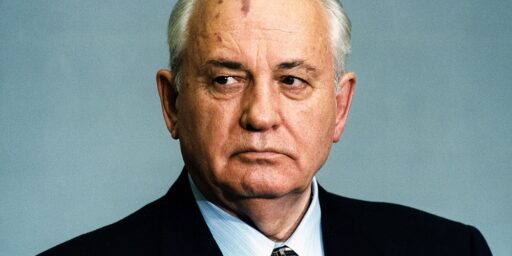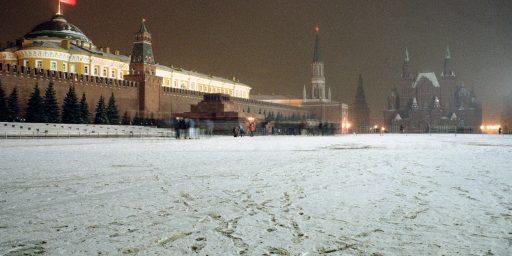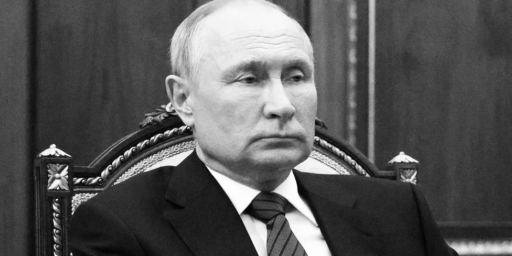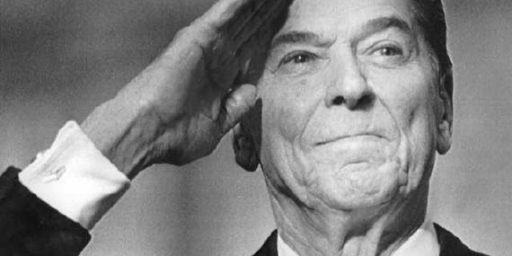Bernie Sanders’ Soviet Sister City
There's nothing to see here, folks.

The New York Times conducted an exhaustive study of the Russian archives involving then-Burlington, Vermont Mayor Bernie Sanders’ efforts to find a sister city in the Soviet Union. It published its findings in a report titled “As Bernie Sanders Pushed for Closer Ties, Soviet Union Spotted Opportunity.” It has the ominous subhed “Previously unseen documents from a Soviet archive show how hard Mr. Sanders worked to find a sister city in Russia when he was a mayor in the 1980s. Moscow saw a chance for propaganda.”
I read the report twice-biased against Sanders. First, he’s by far my least favorite of the major contenders for the Democratic nomination and I would welcome an exposé that further diminishes his chances in that contest. Second, I already think he is a fellow traveler and Communist sympathizer.
But there’s nothing even the least bit damning here.
The mayor of Burlington, Vt., wrote to a Soviet counterpart in a provincial city that he wanted the United States and the Soviet Union to “live together as friends.”
Unbeknown to him, his desire for friendship meshed with the efforts of Soviet officials in Moscow to “reveal American imperialism as the main source of the danger of war.”
That mayor was Bernie Sanders, and the story of his 1988 trip to the Soviet Union has been told before. But many of the details of Mr. Sanders’s Cold War diplomacy before and after that visit — and the Soviet effort to exploit Mr. Sanders’s antiwar agenda for their own propaganda purposes — have largely remained out of sight.
The New York Times examined 89 pages of letters, telegrams and internal Soviet government documents revealing in far greater detail the extent of Mr. Sanders’s personal effort to establish ties between his city and a country many Americans then still considered an enemy despite the reforms being initiated at the time under Mikhail S. Gorbachev, the Soviet general secretary.
They also show how the Kremlin viewed these sister city relationships as vehicles to sway American public opinion about the Soviet Union.
“One of the most useful channels, in practice, for actively carrying out information-propaganda efforts has proved to be sister-city contact,” a Soviet Foreign Ministry document provided to Yaroslavl officials said.
Now, that above-linked report from last year, “Mayor and ‘Foreign Minister’: How Bernie Sanders Brought the Cold War to Burlington: Referendums, rallies, a trip to Nicaragua — all were part of his effort to infuse left-wing activism into local politics,” is indeed damning. It shows him in the mid-1980s as a willing stooge and apologist for the brutal socialist dictatorship in Nicaragua. It also shows him as a rather lousy mayor—more interested in undermining his country’s foreign policy than fixing potholes and otherwise tending to his constituent’s interests.
But the sister city relationship with Yaroslavl was harmless. It was part of a longstanding effort that began under President Eisenhower in 1956 and was still enthusiastically supported by President Reagan three decades later.
That the Soviets saw the project differently than the Americans is, well, not surprising.
Nothing in the documents suggests that Mr. Sanders was the only local American official targeted for propaganda, or even that he was particularly receptive to it, though they do describe him as a socialist. But the documents do show the Soviets’ intensive preparation to use Mr. Sanders’s interest in their country to their advantage.
But there’s no evidence presented that they gained any advantage or that Sanders meaningfully contributed to it. And, as much a Cold Warrior as I was at the time—I was commissioned and started field artillery training at Fort Sill the year in question—we were in fact in the era of Glasnost and Perestroika and near the collapse of the Soviet Union.
This is as bad as the report gets:
Mr. Sanders’s involvement in the Cold War debate grew in the 1980s as he forcefully opposed the Reagan administration’s plans to have Burlington and other American cities make evacuation plans for a potential nuclear war.
Instead, Mr. Sanders reached out to the Soviet Union via an organization based in Virginia, requesting a sister-city partnership with the Cold War adversary in an effort to end the threat of nuclear annihilation.
“We were saying: The goal is to not have a nuclear war, not to plan and prepare for it,” said Terry Bouricius, a Burlington alderman at the time who accompanied Mr. Sanders on the trip.
While I very much support the goal of avoiding nuclear war, that doesn’t mean it’s not prudent to plan and prepare for the eventuality. And, again, it’s not the remit of the mayor of fucking Burlington to decide United States foreign policy.
This report is yet another reminder that Sanders is something of a simpleton when it comes to foreign policy. But there’s no evidence of wrongdoing. He may well have been an idiot, but he was not a useful one.
Correction: In the original version of the post, I misidentified the Sandinista government as “communist” when they self-identified as “socialist.” Still, Daniel Ortega considered himself a Marxist-Leninist, he was trained in Communist Cuba, and “his first period in office was characterized by a controversial program of nationalization, land reform, wealth redistribution and literacy programs.” It wasn’t Scandinavian social democracy.






As anyone who’s reads these comment sections knows, I’m certainly no fan of Bernie. But I read the article and came away with the same conclusion as you. And though the article was fair, the headline (at the least the one that was showing in my browser this morning) seemed to be putting a thumb on the scale against Bernie.
Not really the main issue here, but this:
…is complete bullshit.
From Wiki:
The “brutal communist dictatorship in Nicaragua” were, in fact, the good guys.
Not perfect by any stretch of the imagination, mind you, but much, much better than the US-supported terrorists who opposed them.
To add to my previous comment, there was a brutal, US-backed, right-wing dictatorship in Nicaragua until 1979. No previous tradition of serious democracy whatsoever.
Then the right-wing dictator gets overthrown by some lefty rebels. They make serious efforts in trying to get a democracy going, while simultaneously facing a brutal, US-funded terror campaign.
Shit isn’t perfect and the former lefty rebels don’t succeed in keeping clean hands, while still being far less evil than either the Somozas who came before them or the Contras who are meanwhile out there killing and raping in the countryside.
And suddenly THEY are the brutal dictatorship?
Maybe Sanders isn’t the only simpleton around.
Even about Nicaragua, I think FSLN was not even communist – the communists in Nicaragua were the pro-soviet Nicaraguan Socialist Party and the pro-albanian Marxist–Leninist Popular Action Movement; the private sector produced most of the GDP, there was oposition parties, and independent newspapers (like the La Prensa), etc. At least since 1984, Nicaragua was more a kind of “illiberal democracy” than a classical dictatorship .
About the “brutal”, well, this is a very polemic field, but, for what I know and have read, I had the suspicion that the Daniel Ortega’s government is more brutal today than it was in the 1980s (or perhaps was a question of having less open repression simply because there was less civil unrest?).
@Miguel Madeira: You’re correct that the Sandinistas called themselves “socialist” rather than “communist,” even if they drew inspiration from Castro’s Cuba. I’ve corrected the post accordingly.
@drj: It was far more than “not being perfect.” From the wiki on Sandinista rule:
So, the 1984 elections were far from “free and fair.” It’s also hard to see these as “the good guys.”
But, yes, the situation was complicated by our previous support for another brutal dictatorship.
@drj:
There is (almost) universally too much emphasis placed on regimes or separatist groups without looking at the conditions that give rise to dictatorships or armed rebellions. Typically they are only viewed through ideology, but only if it’s convenient.
This sort of thing is why they’re called FTFNYT. I’m just hoping they don’t go all in on Burisma. If it turns into click bait they will.
@James Joyner:
The Sandinistas in the early 80s were better than anything that came before them. That’s simply a fact. There is still plenty to criticize, of course. I never denied that.
But the main issue here is that you condemned Sanders for being a “willing stooge and apologist for the brutal communist dictatorship in Nicaragua.”
If Sanders was a “stooge” and “apologist,” what were YOU at the time?
I bet you were – using your own terms, of course – a willing stooge and apologist for a brutal right-wing terrorist campaign.
The fact of the matter is that the Contras were a LOT worse than the Sandinistas and the situation they sought to recreate was a LOT worse than anything the Sandinistas did at the time.
So it appears that you are condemning Sanders for doing something that was considerably LESS bad than what you did.
Not even intentionally, I am sure, but out of complete ignorance and the mindless swallowing of GOP propaganda. (You didn’t even know that the Sandinistas largely weren’t communists, for crying out loud.)
There is this saying about a mote and a beam. I think it is applicable here.
@drj:
A college freshman.
I’m sure I bought the propaganda at the time, and certainly saw the situation as more black and white than it was. Ortega was a Castro-trained Marxist-Leninist who followed many of the Castro regime’s policies but, yes, both were replacing pretty awful governments that we backed mostly because they were anti-Communist. Our policy frameworks, on a bipartisan basis, were almost entirely through a Cold War lens.
@James Joyner:
Fair enough. But did you change your mind afterward?
But then you should acknowledge that in this case Sanders was less hampered by his ideological blinders than e.g. Reagan.
Or do you think that Nicaraguans should simply be willing to suffer under a right-wing dictatorship in order to keep Americans safe from communist-adjacent ideologies?
Nicaraguans are people, too, you know. That country deserved more than to be a means to an American end.
(Also, I am quite sure that the Somozas created more communists than the Sandinistas ever did.)
In that regard at least, Sanders was 100% right.
@drj:
I don’t fault Sanders for being sympathetic to the plight of the Nicaraguan people. But he showed his consistent pattern of admiration for leftist governments and had a blind spot for their excesses.
Now, obviously, we have—again, on a bipartisan basis with perhaps the exception of the Jimmy Carter years—tended to turn a blind eye to the excesses of governments who serve our perceived foreign policy interests. Still, I think US foreign policy should be made by the President and Congress of the United States, not the mayor of Burlington, Vermont.
@James Joyner:
“Dissent not welcome here.” That’s the ultimate implication here, isn’t it?
So much for that shining city upon a hill.
LGM has a story on this. Unremarkable except for the entirely appropriate title, https://www.lawyersgunsmoneyblog.com/2020/03/the-worst-story-on-bernie-sanders-ever-written
This sort of thing from FTFNYT shows how easily they’ll move from Bernie is a commie to Biden is a socialist, and Burisma!!!!
So Bernie was against American policy in Central America at the time was he? Wow, it doesn’t really get any worse than that, does it?